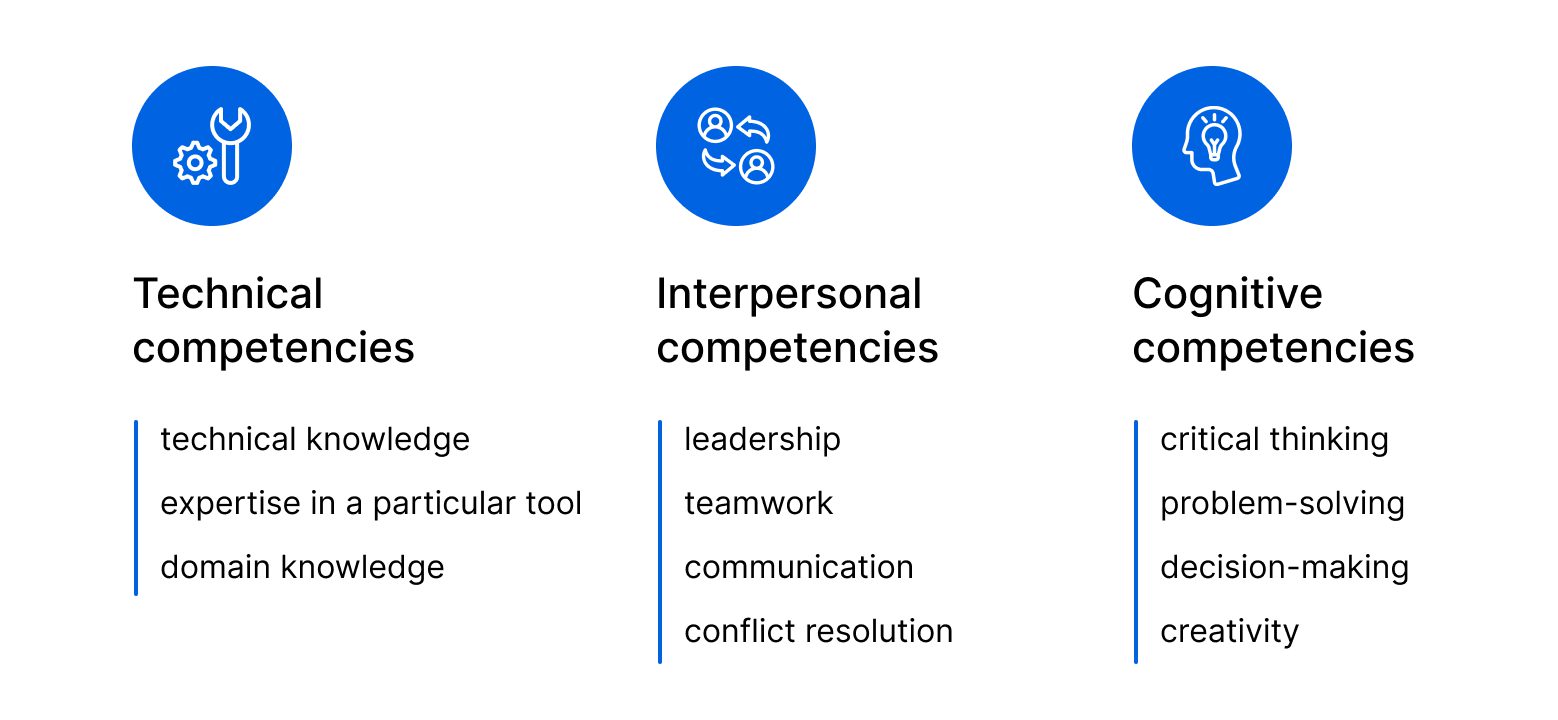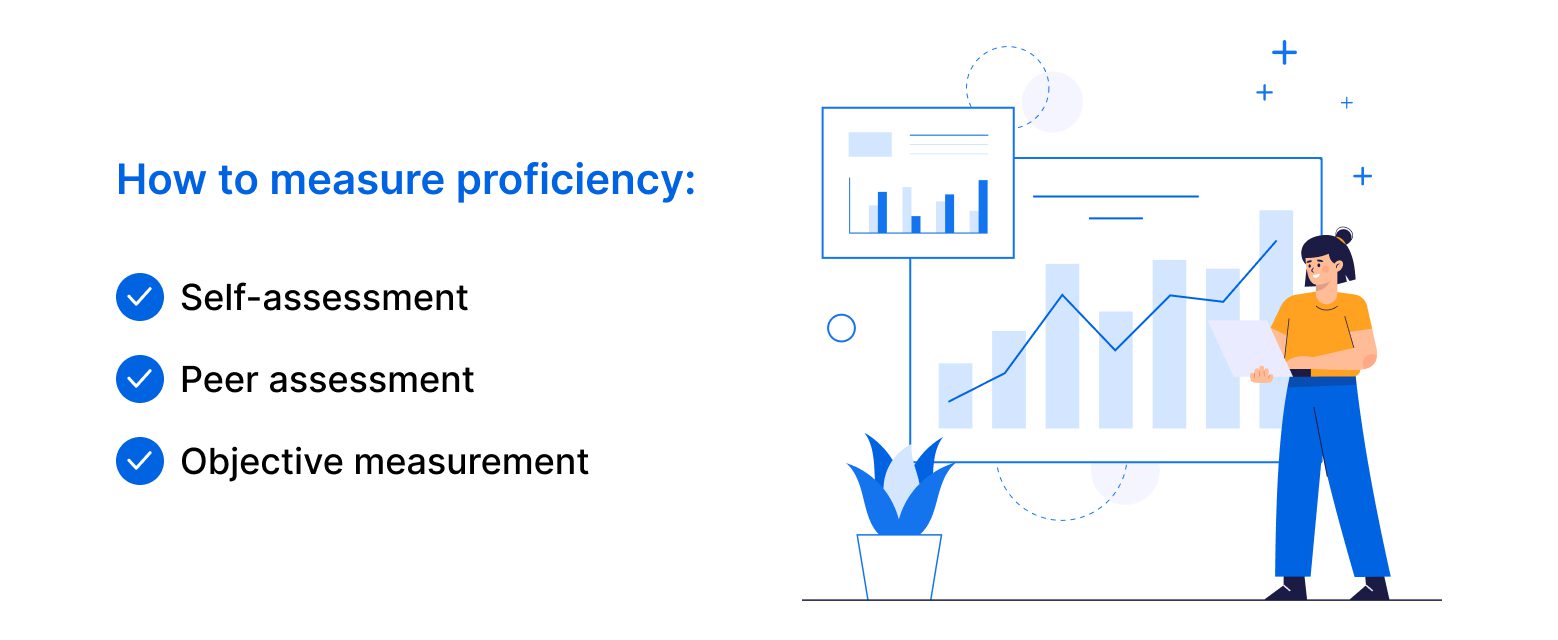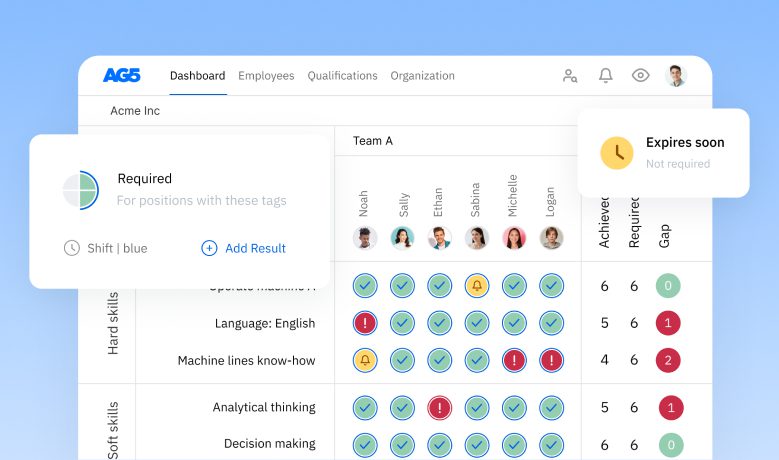Competency vs. proficiency: Understanding the differences and their importance for skills development
In this article, we explain the differences between competency and proficiency. It highlights their distinct roles in skills development and how organizations can utilize this understanding for better employee management.

In the context of skills development, the terms “competency” and “proficiency” are often used interchangeably. However, they have distinct meanings that are essential for understanding the skills of an individual or team.
Here, we’ll explore the differences between competency and proficiency, as well as how they relate to skills development. We will also discuss how AG5 skills management software can help organizations effectively manage their employees’ competencies and proficiencies.
What is competency?Copied
Competency combines knowledge, skills, and behaviors required to perform a specific job or task effectively. Competency is often specific to a particular position or function, and may differ for different roles within the same organization.

Competencies can be broadly categorized into three types:
- Technical competencies refer to the knowledge and skills required to perform a job or task effectively. These competencies may include technical knowledge, expertise in a particular tool or software, or domain knowledge.
- Interpersonal competencies are communicating, collaborating, and working effectively with others. These competencies may include leadership, teamwork, communication, and conflict resolution.
- Cognitive competencies are the mental abilities to perform a job or task effectively. These competencies include critical thinking, problem-solving, decision-making, and creativity.
What is proficiency?Copied
Proficiency refers to the level of expertise an individual or team has achieved in performing a specific job or task. It is the degree of mastery or skill an individual or group has in a particular area. Proficiency is often measured against a standard or benchmark that represents the level of skill required for a specific job or task. The higher the level of proficiency, the greater the skill and expertise.
Proficiency can be measured in various ways, including:
- Self-assessment involves an individual assessing their proficiency in a particular skill or task.
- Peer assessment involves colleagues or team members evaluating each other’s proficiency.
- Objective measurement involves an external measure of an individual or team’s proficiency, such as through testing or assessment tools.

Competency vs. proficiencyCopied
While competency and proficiency share some similarities, the two have essential differences:
- Definition: Competency refers to an individual’s knowledge, skills, and abilities and can apply in a particular context. Conversely, proficiency refers to the level of skill or expertise that an individual has in a specific area or task.
- Scope: Competency tends to be broader in scope than proficiency. Competency covers a range of skills and knowledge, while proficiency focuses on a specific skill or task.
- Development: Competency can be developed over time through education, training, and experience. Conversely, proficiency is more closely linked to performance and can be demonstrated through tasks or projects.
- Evaluation: Competency is usually evaluated through assessments or evaluations that assess an individual’s knowledge, skills, and abilities in a particular area. Proficiency is typically evaluated through performance on a specific task or project.
- Relationship: Competency and proficiency are related in that a person can be proficient in a particular skill or task due to having the necessary competencies. In other words, competency is an essential foundation for proficiency.
Importance of competency and proficiency for skills developmentCopied

Competency and proficiency are critical components of skills development, and they play a vital role in enhancing an individual’s ability to perform various tasks effectively. Here are five reasons why competency and proficiency are essential for skills development:
- They allow individuals to complete their work effectively and efficiently, leading to higher productivity.
- Competence and proficiency in one’s job can lead to fulfillment and accomplishment, increasing job satisfaction.
- Competency and proficiency can lead to better job opportunities and career advancement, as individuals are more likely to be recognized for their skills and expertise.
- Competency and skill proficiency can boost confidence levels and improve overall performance.
- Competent and proficient individuals are better equipped to adapt to new technologies, work processes, and job requirements, which is crucial in today’s rapidly changing work environment.
Get your team up to speed with AG5 skills management softwareCopied
AG5 skills management software is a powerful tool that can help organizations manage their employees’ competencies and proficiencies in various ways. Here are some ways in which it can be beneficial:
- Identify skills gaps and target training programs
- Monitor employee progress and identify those who need additional support
- Create career paths based on current competencies and goals
- Support succession planning by identifying potential replacements for key personnel
- Increase employee engagement by providing a clear path for advancement.

AG5 skills management software is a powerful tool for organizations looking to manage their employees’ competencies and proficiencies. Moreover, they can develop their employees’ competencies and achieve a high level of proficiency, ensuring they have the necessary skills to succeed in their roles.

